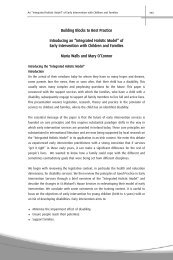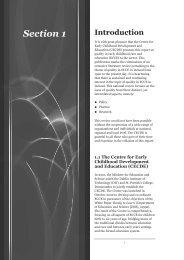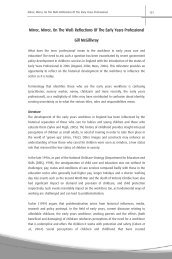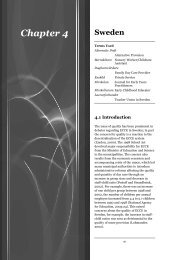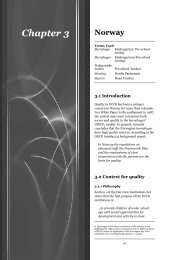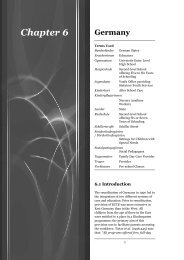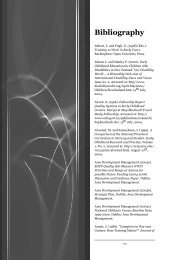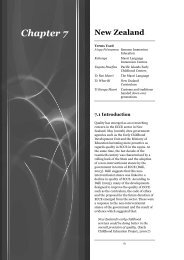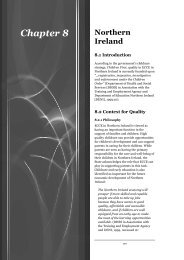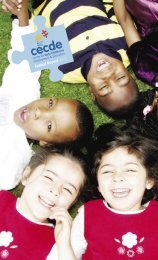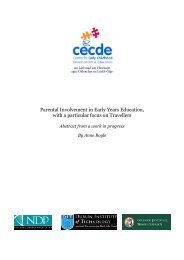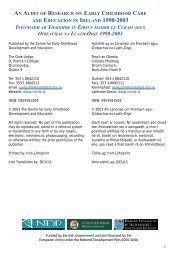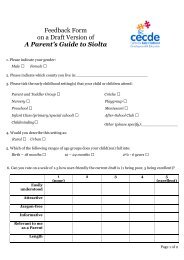Policy Developments 1990-2004 - Centre for Early Childhood ...
Policy Developments 1990-2004 - Centre for Early Childhood ...
Policy Developments 1990-2004 - Centre for Early Childhood ...
You also want an ePaper? Increase the reach of your titles
YUMPU automatically turns print PDFs into web optimized ePapers that Google loves.
Section 4<strong>Policy</strong> <strong>Developments</strong> <strong>1990</strong>-<strong>2004</strong>the core characteristics of quality childcareas incorporating opportunities <strong>for</strong> thefollowing:To develop understanding of the worldaround them;To <strong>for</strong>m consistent, loving relationships;To explore and experiment;To engage in activities which encouragephysical development;To enjoy learning through play;To negotiate obstacles and conflict;To celebrate ef<strong>for</strong>t and mastery of newskills;To practise new skillsTo develop a positive sense of self;Learning how to learn (Dowd, 2000:5).Dowd (2000) proposes that the quality of aservice can be determined by a number ofcriteria upon which the child’s interactionswith adults and other children depend, theopportunities <strong>for</strong> new experiences and theability to cope with different environmentsare central. Other criteria include thequality of the following elements:Staff;Policies and procedures;Curriculum;Play;Provision <strong>for</strong> children with specialneeds;Parental involvement;Discipline;Diversity (Dowd, 2000:6-9).Canavan (2000) Quality Childcare inthe Workplace – A Step-by-StepGuide <strong>for</strong> Employers outlines strategiesand provides exemplars <strong>for</strong> employersproviding quality childcare services in theworkplace. French (2000), superseded byFrench (2003), provides a comprehensiveguide to Supporting Quality (French,2003) in the Irish context. This detailssupports in regard to early childhoodservices to ensure quality on issues such as:Policies and procedures;Management;Human resources;Partnership with families andcommunity;Child-centred environment;Curriculum;Observations and assessment andbehaviour management;Health and safety (French, 2003).The St. Nicholas Montessori Societyof Ireland (SNMSI) issued Guidelines<strong>for</strong> Montessori Schools (SNMSI, n.d.).These guidelines place great emphasis onthe “Prepared Environment,” both indoorand outdoors, in line with the teachingsand philosophy of Maria Montessori. Theyalso delineate the materials and subjectareas <strong>for</strong> activities to be conducted inMontessori schools. The guidelines arecurrently under review and a revisededition is expected shortly.Pavee Point is a partnership of IrishTravellers and settled people workingtogether to improve the lives of IrishTravellers through working towards socialjustice, solidarity, socio-economicdevelopment and human rights (PaveePoint, Accessed at: http://www.paveepoint.ie/pav_about_a.html, 8 th June, <strong>2004</strong>).The organisation has produced many policydocuments relating to ECCE in Ireland,most notably Éist – RespectingDiversity in <strong>Early</strong> <strong>Childhood</strong> Care,Education and Training (Murray andO’Doherty, 2001). This document outlinesthe challenges of embracing diversity in theIrish context and the importance of an antibiasapproach to ensure a qualityexperience <strong>for</strong> all:In accordance with the principles ofquality in early years provision, allservices <strong>for</strong> children need to putequality policies in place which43



